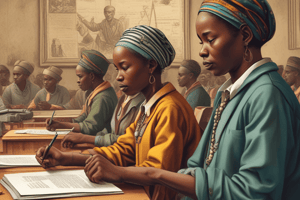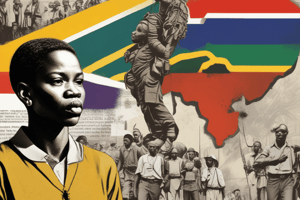Podcast
Questions and Answers
When was the National Education Coordinating Committee (NECC) established?
When was the National Education Coordinating Committee (NECC) established?
- March 1986 (correct)
- March 1985
- March 1987
- March 1989
What was the primary goal of the NECC?
What was the primary goal of the NECC?
- To promote the Bantu Education curriculum
- To provide educational resources to white South Africans
- To support the apartheid regime's education policies
- To reform the educational system and combat racial inequalities (correct)
What was the slogan of the NECC's education advocacy?
What was the slogan of the NECC's education advocacy?
- Education for Empowerment
- Education for Equality
- Education for Justice
- Education for Liberation (correct)
What was the outcome of the NECC's student activism around 1987?
What was the outcome of the NECC's student activism around 1987?
How did the apartheid government respond to the NECC's efforts?
How did the apartheid government respond to the NECC's efforts?
What was the NECC's approach to challenging the apartheid education system?
What was the NECC's approach to challenging the apartheid education system?
Why did the apartheid government ban the NECC?
Why did the apartheid government ban the NECC?
What was the outcome of the NECC's efforts to challenge the apartheid education system?
What was the outcome of the NECC's efforts to challenge the apartheid education system?
What was the main purpose of the NECC bringing together students, parents, and teachers?
What was the main purpose of the NECC bringing together students, parents, and teachers?
What was the NECC's approach to education reform?
What was the NECC's approach to education reform?
What was the outcome of the NECC's advocacy for 'Education for Liberation'?
What was the outcome of the NECC's advocacy for 'Education for Liberation'?
What was the impact of the NECC's mobilization of student activism?
What was the impact of the NECC's mobilization of student activism?
What was the consequence of the NECC's protests and school boycotts?
What was the consequence of the NECC's protests and school boycotts?
What was the NECC's stance on the Bantu Education curriculum?
What was the NECC's stance on the Bantu Education curriculum?
Why did the NECC's efforts pose a threat to the apartheid regime?
Why did the NECC's efforts pose a threat to the apartheid regime?
What was the broader strategy of the apartheid government in banning the NECC?
What was the broader strategy of the apartheid government in banning the NECC?
What was the primary purpose of the NECC's efforts to reform the education system?
What was the primary purpose of the NECC's efforts to reform the education system?
What was the impact of the NECC's efforts on student activism?
What was the impact of the NECC's efforts on student activism?
What was the significance of the NECC's advocacy for 'Education for Liberation'?
What was the significance of the NECC's advocacy for 'Education for Liberation'?
Why did the apartheid government ban the NECC?
Why did the apartheid government ban the NECC?
What was the broader strategy of the apartheid government in banning the NECC?
What was the broader strategy of the apartheid government in banning the NECC?
What was the NECC's approach to combating racial inequalities in education?
What was the NECC's approach to combating racial inequalities in education?
What was the significance of the NECC bringing together students, parents, and teachers?
What was the significance of the NECC bringing together students, parents, and teachers?
What was the outcome of the apartheid government's response to the NECC's efforts?
What was the outcome of the apartheid government's response to the NECC's efforts?
What was the primary focus of the NECC's education reform efforts?
What was the primary focus of the NECC's education reform efforts?
What was the consequence of the NECC's mobilization of student activism?
What was the consequence of the NECC's mobilization of student activism?
What was the apartheid government's broader strategy in banning the NECC?
What was the apartheid government's broader strategy in banning the NECC?
What was the NECC's approach to addressing racial inequalities in education?
What was the NECC's approach to addressing racial inequalities in education?
What was the significance of the NECC bringing together students, parents, and teachers?
What was the significance of the NECC bringing together students, parents, and teachers?
Flashcards are hidden until you start studying




